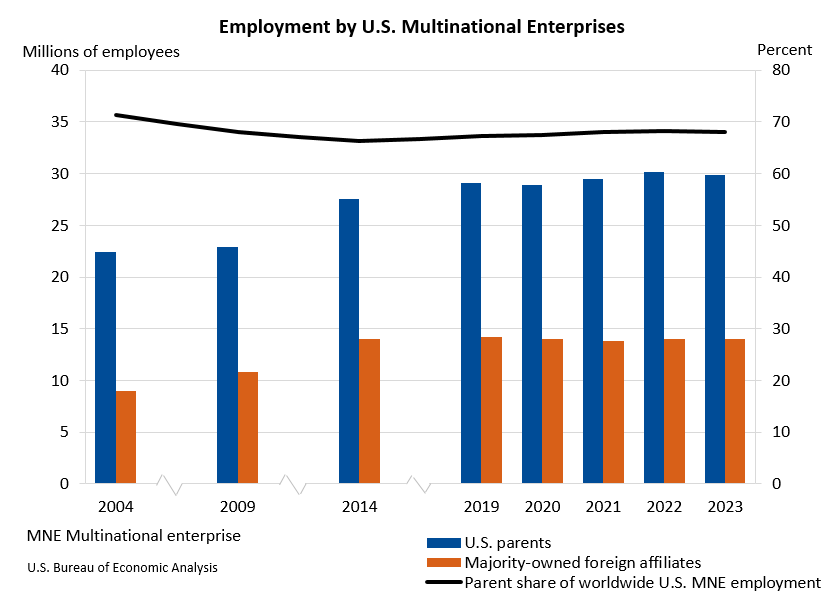Bureau of Economic Analysis
Activities of U.S. Multinational Enterprises, 2023
Worldwide employment by U.S. multinational enterprises decreased 0.4 percent to 43.9 million workers in 2023 (preliminary) from 44.1 million workers in 2022 (revised), according to statistics released today by the U.S. Bureau of Economic Analysis on the operations and finances of U.S. parent companies and their foreign affiliates.
Principal Federal Economic Indicators
Noteworthy
- 2025 News Release Schedule
- Innovation at BEA
- 2025 Annual Updates
- Distribution of Personal Income Nowcast
- New! Services Trade Data for More Countries
- Data Tool: Trade in Value Added
- Updated: RIMS II Regional Multipliers
- Arts and Culture
- Space Economy
- FDI Now in State BEARFACTS
- Quick Guide: Price Indexes
The Latest
BEA's Brent Moulton to Receive 2015 Julius Shiskin Award
Brent Moulton, Associate Director for National Economic Accounts of the Bureau of Economic Analysis (BEA), has been selected to receive the 2015 Julius Shiskin Memorial Award for Economic Statistics. The award recognizes unusually original and important contributions in the development of economic statistics or in the use of statistics in interpreting the economy.
BEA Continues to Explore Reliability of Successive Vintages of Real GDP Estimates
The U.S.
March 2015 Trade Gap is $51.4 Billion
The U.S. monthly international trade deficit increased in March 2015 according to the U.S. Bureau of Economic Analysis and the U.S. Census Bureau. The deficit increased from $35.9 billion in February (revised) to $51.4 billion in March, as imports increased more than exports. The previously published February deficit was $35.4 billion. The goods deficit increased $14.9 billion from February to $70.6 billion in March. The services surplus…
U.S. International Trade in Goods and Services, March 2015
U.S. Census Bureau U.S. Bureau of Economic Analysis NEWS U.S. Department of Commerce * Washington, DC 20230 U.S. INTERNATIONAL TRADE IN GOODS AND SERVICES March 2015 The U.S. Census Bureau and the U.S.
New Data Tool Provides Fast Access to Trade and Investment Stats for Countries
The Bureau of Economic Analysis launched today a new data tool on its website that gives users a snapshot of statistics on trade and investment between the United States and another country by simply clicking on a world map.
These fast facts at your fingertips can include:
Real Consumer Spending Rose in March
Personal income increased less than 0.1 percent in March after rising 0.4 percent in February. Wages and salaries, the largest component of personal income, rose 0.2 percent in March after rising 0.3 percent in February.
Current-dollar disposable personal income (DPI), after-tax income, increased less than 0.1 percent in March after rising 0.5 percent in February.
Real DPI, income adjusted for taxes and…
Personal Income and Outlays, March 2015
Personal income increased $6.2 billion, or less than 0.1 percent, and disposable personal income (DPI) increased $1.6 billion, or less than 0.1 percent, in March, according to the Bureau of Economic Analysis. Personal consumption expenditures (PCE) increased $53.4 billion, or 0.4 percent.
GDP Up Slightly in First Quarter
Real gross domestic product (GDP) increased 0.2 percent in the first quarter of 2015, according to the “advance” estimate released by the Bureau of Economic Analysis. In the fourth quarter of 2014, real GDP increased 2.2 percent. In the first quarter, the dollar strengthened against major currencies, imports and exports were delayed because of labor disputes in key ports, energy prices declined, and several regions experienced severe weather…
Gross Domestic Product, 1st quarter 2015 (advance estimate)
Real gross domestic product -- the value of the production of goods and services in the United States, adjusted for price changes -- increased at an annual rate of 0.2 percent in the first quarter of 2015, according to the "advance" estimate released by the Bureau of Economic Analysis.
Nondurable Goods Manufacturing Led Growth in the Fourth Quarter Gross Domestic Product by Industry
Nondurable goods manufacturing was the leading contributor to U.S. economic growth in the fourth quarter of 2014. Both private goods- and services-producing sectors contributed to the increase, while the government sector decreased. Overall, 15 of 22 industry groups contributed to the 2.2 percent increase in real GDP.




